Rev Fidon Mwombeki, general secretary of the All Africa Conference of Churches, has expressed concern at the slow pace of the South Sudan peace process, while highlighting that the Africa-wide ecumenical body has accompanied the people in the world’s youngest nation for many years.
His comments come amid growing fears that the September, 2018, Revitalised Agreement on the Resolution of the Conflict in South Sudan was facing too many obstacles, as its key elements remained unimplemented or were lagging behind.
“I am not satisfied. I am very disappointed by lack of progress in South Sudan. The All Africa Conference of Churches has invested a lot for many years to bring peace together and bring the country together,” Mwombeki, a Tanzanian Lutheran pastor, told journalists in Nairobi on 14th August.
“I plead with the churches there to take the lead by saying: ‘OK, we want to be together and we reject the politics of fragmentation’.”

Rev Fidon Mwombeki, general secretary of the All Africa Conference of Churches. PICTURE: Marcelo Schneider/WCC
In 2011, South Sudan became an independent state after seceding from Sudan, the largely Arab and Islamic north-east African country.
But within two years, a new conflict ignited following political disputes.
On 4th August, the Freedom for Change, a body representing the protesters and the Transitional Military Council signed a declaration to form a transitional government.
“I am partly satisfied with Sudan because I think, this demonstrates how Africa can solve its problems,” said Mwombeki.
According to Mwombeki, Sudan’s people who were tired of the regime chose to demonstrate peacefully.
“Now they have reached an agreement on how they are going to manage their country. We are seeing these changes in Africa…so peaceful through democratic or semi-democratic with these negotiations with the public. For me this proves the maturity of African politics,” he said.
Mwombeki said the All Africa Conference of Churches was proactive and prophetic in the accompaniment of churches, meaning it did not always wait to be invited to take action.
“There are some situations that we see the need to take action to accompany the churches. With the crisis in Cameroon, should we wait until we are invited by the churches?” he asked.
This article was first published on the World Council of Churches’ website.





